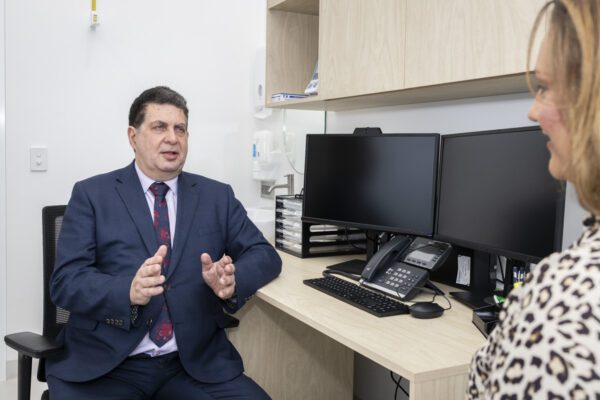The daily grind of dealing with diabetes and other chronic conditions can take its toll on mental wellbeing, causing anxiety, emotional distress, burnout, and depression, and making successful treatment more challenging.
Diabetes is relentless. From the moment you wake each morning until you finally close your eyes each night, thoughts of blood glucose levels, carbohydrate amounts, and insulin dosages crowd your mind.
In fact, Diabetes Australia estimates that people with diabetes make up to 180 diabetes-related decisions every day or more than 65,000 extra decisions a year.

And in the case of Type 1 Diabetes, the sad reality is that it will never go away. If you have Type 2 diabetes, the good news is that in some cases it can be reversed, but only through hard slog – a careful diet, increased exercise, and a lot of collaboration with your endocrinologist or diabetes educator.
Is it any wonder that people with diabetes are at a significantly higher risk of developing anxiety disorders or depression? The endless day in and day out of managing this chronic disease is exhausting and many diabetics end up craving a break or even worse, they choose not to accept the daily burden of diabetes.

They may start to ignore their blood sugar levels or simply forget to check them regularly. They may adopt poor lifestyle habits such as exercising less, eating more junk or processed foods, drinking more alcohol, and smoking. This is what diabetes burnout looks like – it is real and more common than you would think.
Trish Bowden, Lead Registered Nurse and Diabetes Educator at The Banyans Health and Wellness, has worked with hundreds of people with diabetes during her 30-year career and has gained an extensive understanding of the mental health challenges of living with chronic disease.
“Diabetes is not something you can ever switch off from,” Trish says. “The need for constant vigilance can wear even the strongest patients down over time, particularly younger people who may have difficulty accepting that they are in this for the long haul.”
Stress can aggravate diabetes
Stress can increase blood sugar levels higher, activate fat cells, impair glucose intolerance, increase insulin resistance, and generally makes good diabetic control more difficult to achieve.
According to a Diabetes Australia survey, 37% of people with diabetes feel burned out by the constant need to manage their condition, while 27% say the mental health challenges of diabetes make it harder to manage.
Statistics from Diabetes UK show people with diabetes are 29% more likely to have depression than those without, and that risk increases to 53% for insulin users.
A frightening statistic from Diabetes Australia is more than 80% of people with diabetes have not sought psychological support.

Psychological health just as important as physical health
The Banyans Health and Wellness Clinical Director and Senior Psychologist, Peter Hayton, says it’s important for people with diabetes to understand the importance of looking after their emotional health as well as their physical health.
Living with diabetes is difficult and can feel like a burden, Peter says, and the constant worry can lead to emotional distress and sometimes burnout.
“It’s okay to not be okay. And people with diabetes need to understand that help and support is available,” says Peter.
“We encourage people with diabetes to seek assistance as soon as they feel they are struggling with any mental health conditions such as anxiety or depression, or if they simply feel they are unable to cope.”
The Banyans Health and Wellness has several mental health programs available that can provide support when dealing with issues such as anxiety or depression. The Banyans’ residential programs include onsite access to regular psychiatric and psychological assistance from its world-leading medical team and round-the-clock care from its mental health trained nursing and support staff.
In addition, The Banyans Health and Wellness offers a Chronic Stress and Burnout residential program.
“Psychological and emotional therapies are critical ingredients to ensure long-term recovery for chronic stress and burnout,” says Peter. “During this program, which includes regular consultations with a psychologist and a counsellor, we provide guests with the tools and supports they need to successfully navigate the ongoing challenges of living with diabetes, enabling them to learn how to live well and happily with that chronic disease.”
An important component of this program is helping guests to incorporate physical exercise and yoga therapies into their daily schedule, which brings added benefits to those living with diabetes.

“Regular physical exercise is essential for people with diabetes, particularly in their efforts to prevent long-term complications from the disease,” says Peter, adding these complications include an increased likelihood of eyesight problems, heart disease, vascular disease, and stroke.
“Sometimes, the pressure to incorporate regular exercise can become too much. The Banyans team will tailor a program for our guests so that it doesn’t feel like such a burden, but will actually help to alleviate stress, regulate their emotions, and improve their sleep.”
It’s not just about diabetes
Living with a chronic disease of any kind is an ongoing challenge for their sufferers. A chronic condition is anything that persists for a year or more. The ability to manage medications, worry about ongoing expenses, and maintaining motivation to continue with necessary treatments are common concerns among all chronic disease sufferers.
The Banyans Health and Wellness programs can be tailored to suit individual needs regardless of the underlying chronic condition. “Anyone who is dealing with anxiety and depression relating to the daily management of a chronic disease should seek help as quickly as possible,” Peter says.
“The longer an underlying mental health condition is left untreated, the more likely it is to have to a significant impact on the successful management of the chronic condition.”
The Banyans offer an all-inclusive, holistic approach to recovery. Benefit from effective treatment and one-on-one therapy to gain measurable outcomes and freedom from your destructive patterns. Our Intake Team are available any time to help you design a personalised program for private rehabilitation.
For a confidential discussion about how you or someone you care about can benefit from The Banyans, call us on 1300 BANYAN (1300 226 926) or complete the online form below.





